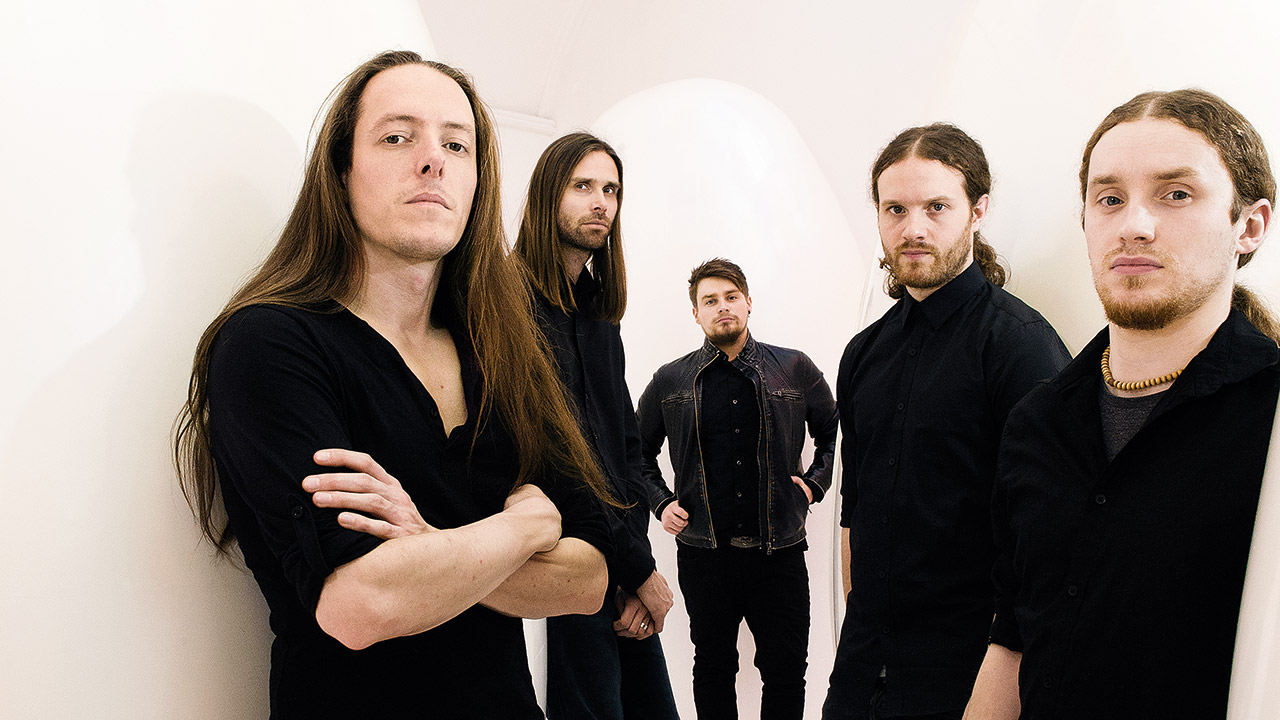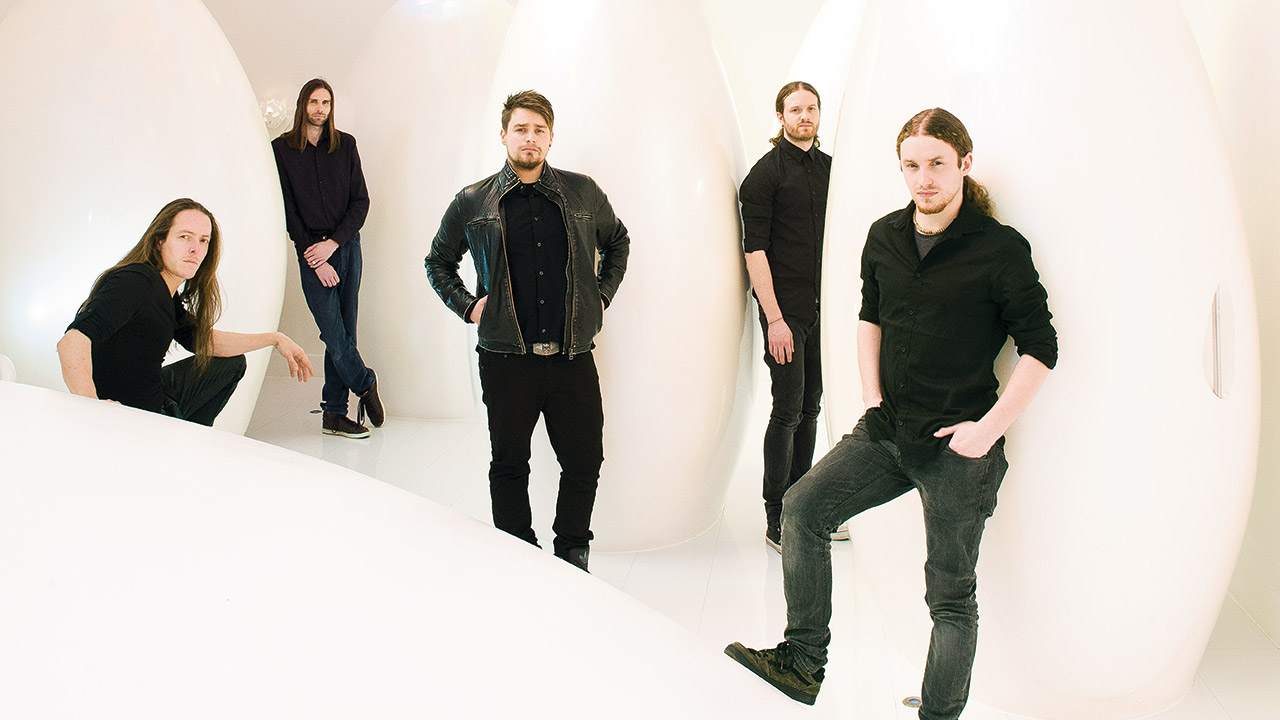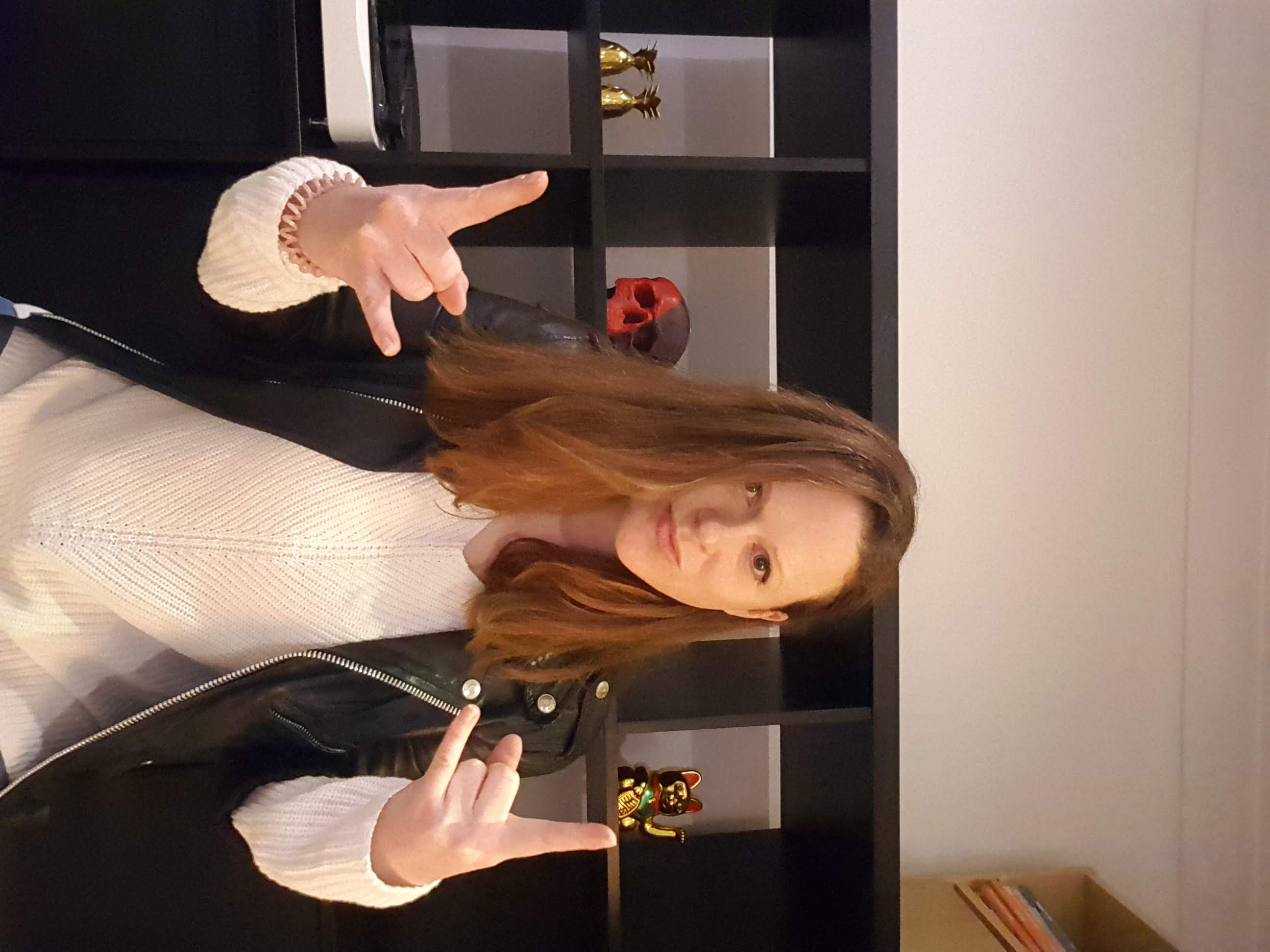Never has the idea of regenesis been so poignant than with TesseracT now on their fifth singer, they’re a band that have repeatedly had to push the reset button in order to keep moving forward. But their uncompromising reluctance to give in or up has made them a pivotal force in today’s progressive landscape. Quietly heralded as ‘the future of metal’ or ‘modern day prog masters’ they’ve carved a chasmal niche, originally spearheading a renaissance in technical progressive metal and now trendsetting the second, less abrasive phase of the movement. But it hasn’t come without its penalties. Cynicism, abandonment, resentment – their fans, or ex-fans, have not been reticent in reaction to their shifting incarnations.
“After the shit that we’ve had over the past few years from public and industry alike we’re not afraid of what people can throw at us any more,” says bassist Amos Williams, without a hint of exasperation.
The first and most fervent backlash came when their third singer Dan Tompkins left the band on the brink of the band breaking through. Having ridden out that storm, but still suffering the residue from a bitter fanbase, they are now hunkering down for the second wave of protest already emerging from their toned-down approach. But they’re far from indignant. Instead, TesseracT are positively philosophical about the whole thing, even using recent events to inspire the concept of their second album Altered State, quickly tending to the bruises left by departing singers, media and fan scorn, the loss of management support and the lack of gig offers. As founding member Acle Kahney puts it in his Zen-like manner – “shit happens”. Despite all the pitfalls, TesseracT are gathering momentum at a speed that fully justifies their New Blood award at last year’s inaugural Progressive Music Awards.

Altered State is not the first time we’ve seen TesseracT in a new guise. The stepping-stone to their growl-free ‘state’ was last year’s Perspective EP, which featured Tompkins’ replacement, US-based Elliot Coleman on vocals. His Jeff Buckley-esque voice lent itself perfectly to an acoustic reworking of songs from their debut album One and signposted a new direction for the band. What it didn’t signal was the subsequent exit of Coleman, perhaps helped by the several thousand-mile stretch of water separating him and the band. It was around this time that a certain debate began and it’s one that still rages on.
“The screaming thing is such a massive elephant in the room,” says their new singer Ashe O’Hara.
“It’s a big issue for fans, but as far as the band are concerned it’s something that helped drive TesseracT on.”
Fan posts are littered with discussion about screams, growls or the absence of (in their new material). Many would argue that the band’s finest moment was Concealing Fate EP, which later found itself as the centrepiece of One. A haven of complex power chords, monolithic off-kilter riffs, visceral growls and spine-tingling vocal crescendos, it’s become the long-standing reference point for fans and the ‘must have’ collection of songs, its nucleus being Acceptance – a slow-brewing, ever shifting arrangement of down-tuned, bass heavy riffs dichotomised by glimmering guitars and mesmerising clear-cut vocals. It was the stuff of dreams for any music nerd looking for emotion in a musical landscape saturated by phlegmatic, coldly calculated instrumentation. And now, just when every other ‘djent’ band is aligned with their solid and acerbic groove, TesseracT have come back with an album that practically removes them from the scene they helped to flourish. Gone are the growls and they’ve pushed back the stop-start trademark djent riffs (a distorted palm-muted power chord for those in the know) to allow for space and disorientating atmospherics.
“With our first album and our first EP there were heavy screamed vocals,” explains Williams. “But even eight years ago, when we started writing, there was a desire to not have that. But because we came from the world of djent or progressive metal, whatever you want to call it, people expect you to be quite metal, to have those things – screamed vocals, heavy guitars, brutal beatdowns – and we no longer feel that we need to do that.”
Subconsciously or not, by making a more progressive, and less ‘heavy’ sounding album, Tesseract have moved away from the legion of metal bands experimenting with progressive sounds. While still ardently considered ‘metal’ they are defining a new sound that is far more emotive than the bludgeoning, riff-heavy styles cropping up everywhere else.
“It’s quite sad that such a genre of progressive rock or metal or just progressive music kind of almost fits into a very predictable realm,” says Williams. “It’s got to have quite virtuoso instrumentalists in it, it’s got to have a solo here or there, it’s
got to go off on a tangent for a while. It’s become predictable in its unpredictability. So we thought maybe we’re going to try and do a verse-chorus thing.”

This time around TesseracT have been influenced by a span of bands that didn’t even factor in previous comparisons. Karnivool, Dead Letter Circus and Cinematic Orchestra get mentioned, even Bowie gets a name check. That’s in addition to Meshuggah and Kahney’s longstanding passion, Dutch prog metallers, Textures. At the crux of their music is emotion; not weepy balladry or aggressive frustration, but more patterns of euphoria, urgency and introspection.
“Certainly the heavier end of the spectrum has two emotions and that’s ‘I’m aggressive’ and ‘I’ve been knocked out by somebody else”, ponders Williams. “It’s either on or it’s off… So for the average person I imagine that all they feel is anger or complete void/null. That’s all I see about modern metal.”
Early reactions to teasers of Altered State remark on the lack of ‘heaviness’, with one particular comment describing it as ‘music for ladies’. But Kahney astutely points out that, if Facebook insights are to be believed, then only nine per cent of their fanbase is female. It’s probably not far from the truth; go to any TesseracT concert, or any djent gig for that matter (heck, any prog show, eh?) and you’ll find what’s commonly termed as a ‘sausage fest’. Coming from one of the nerdiest scenes around the band are very much au fait with the protocol that comes with a catering for an audience so obsessive about their music.
“I always get Facebook questions like ‘what guitar do you use?’ Sometimes people ask me about time signatures but it’s a never a conscious thing to make something 7/8, 15/9 or whatever,” says Kahney.
While sounding as complicated as a Countdown conundrum, these modern proggers’ driving ethos is to go with the flow. But even the musical brain of the band hits a wall sometimes: “I hit a bit of writer’s block for a couple of months,” reveals Kahney. “So I imported a couple of documentaries of space and stuff, muted them and just started writing to video. Suddenly I had two or three minutes of music in the space of day. Devin Townsend said if you get stuck on something just sit back and watch films with a guitar in your hand and see what comes out.”
There’s no point making such evocative music if you’re going to bludgeon it half to death with vocals that can best be described as inappropriate, which is why the quest for singers has been a perpetual challenge. Elliot left when the distance proved too much of a hurdle. It didn’t cause friction but it did leave a gaping hole, which they had wrestled so hard to fill after the departure of Tompkins. They quickly began auditions, wading through hundreds of possible singers, eventually striking gold with 22-year-old Ashe O’Hara.
“We’re lucky to have found Ashe,” enthuses Williams. “He has an instrument in his voice that can convey such powerful emotions. One of my favourite pieces of music is by Andrea Bocelli, the emotion is so powerful that it grabs you and you have no control. And Ashe has a similar quality.”

Already a big fan of TesseracT, O’Hara was well-versed in the history of the band and his audition, although nerve-racking, was a surefire hit.
“I was so nervous,” O’Hara remembers. “I was like ‘I’m a big fan’ blah, blah and that was the first time I’d met them all. We did a few songs
off Concealing Fate and then we went to the pub!”
As part of the audition, O’Hara wrote the vocal lines for Nocturne; it became the first single from Altered State. Not bad for a newbie.
Currently studying at Brighton Institute, O’Hara is more than just a dynamic voice, his hunger for musical creativity is very clear.
“There was such a short period of time between me joining and when they planned for the album that I feel this one is great but I feel like I’m capable of much more and I can’t wait for the next one. But when this album is out people might settle with the fact that this is the final form.”
This article originally appeared in issue 36 of Prog Magazine.

